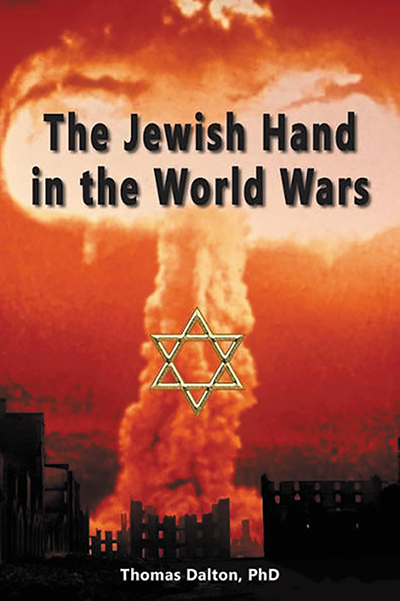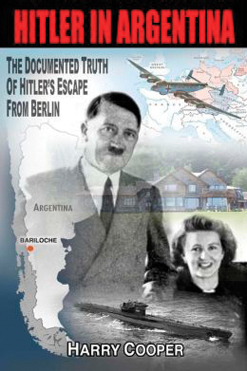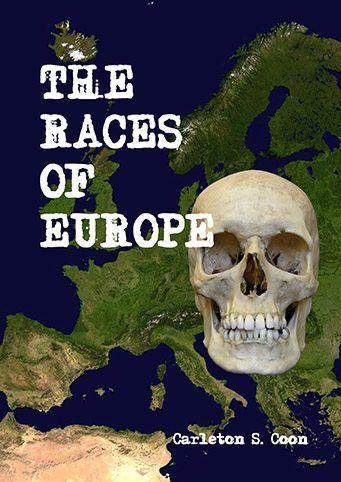Description
For many centuries, Jews have had a negative reputation in many countries and among large parts of the population. The reasons given for this are plentiful, ranging from their anti-Christian theology and social exclusivity to arrogance, conceit, greed and maliciousness. Their perceived belligerence and animosity have been considered legendary. But less well known is their involvement in war; hence the reason for this book.
When we examine the causal factors for war and its primary beneficiaries, the author alleges that we will repeatedly find a prominent Jewish presence. Throughout history, Thomas Dalton says, Jews have played an exceptionally active role in promoting and inciting war. With their long-notorious influence in government, we find recurrent instances of these outsiders promoting hardline stances and actively inciting people to hatred. This behavior, he says, is rooted in Old Testament mandates and, combined with a ruthless materialism, has led them, time and again, to instigate warfare if it served their larger interests. This fact explains much about the present-day world.
In this book, Dr. Thomas Dalton examines in detail the hidden hand in the two world wars. Along the way, he dissects the motives and strategies for maximizing gain amidst warfare, reaching back centuries. He concludes with a brief analysis of more recent wars, and then a peek into the future.
We cannot prevent war until we acknowledge its causes. Some of these causes are rooted in human nature, but others are very deliberate, very strategic actions by a malicious few.
Softcover, 198 pages, #790.
BOOK REVIEW:
A ‘Jewish Hand’ in World Events: Fact or Fiction?
Thomas Dalton pushes the bounds of political correctness yet again
By David Skrbina, Ph.D.
Why discuss Jewish history at all? Why is such a small group of people given so much credit (or blame) for driving historical events? How could they have possibly, after all the persecution they have seen as a people over the centuries, wield any power at all? Few really know the details of this long history, and fewer still know the specific role Jews are alleged to have played in the various global military conflicts that have at times engulfed the entire world. And most assuredly—though TBR and author Thomas Dalton will be called anti-Semites for even daring to discuss it—there is no better subject to explore than the Jewish role in history and whether or not the claims that they have manipulated nations into many devastating wars have any basis of fact at all.
This is precisely what Dalton has done in his thought-provoking new book, The Jewish Hand in the World Wars
No other author has been able to compile, in such concise and clear terms, all key elements of this story. As such, Dalton’s book provides us with an invaluable resource, one overflowing with lessons for the present.
The book begins with some context from ancient times. Literally for millennia, Jews have for some reason—deserved or not—been viewed as troublemakers, agitators and scoundrels. It is highly revealing that nearly every ancient reference to the Jews is negative. Dalton provides a brief overview of this history, beginning with biblical accounts of Joseph and Esther to the various archeological evidence in the Amarna Letters and two ancient stone tablets, before moving on to the documented history.
The formal historical record begins around 300 B.C. with such writings as those of Hecateus, who said, “their way of life is misanthropic and hostile to foreigners,” and Manetho, who alleged that “these people were found mutilating images of the gods without restraint.”
Later, Seleucid King Antiochus VII was counseled to exterminate the Jews outright; Dalton quotes scholar Emilio Gabba as explaining that “they alone, among all peoples, refused all relations with other races, and saw everyone as their enemy.”(1) Apollonius Molon called the Jews “the very vilest of mankind,” and Diodorus Siculus wrote of “the race of Jews, [that] they alone, of all nations, looked upon men as their enemies.” By A.D. 41, Emperor Claudius charged the Jews with “fomenting a general plague, which infests the whole world.”
In the years 115 and 132 A.D., Cassius Dio remarked that:
Jews everywhere were showing signs of hostility to the Romans, partly by secret and partly overt acts. … Many outside nations, too, were joining them through eagerness for gain, and the whole Earth, one might almost say, was being stirred up over the matter.(2)
One gets the picture. We can well understand why Seneca called them “an accursed race,” and why Tacitus described them as “a disease” and “the basest of peoples.” The story continues with extremely critical remarks by the likes of Aquinas, Luther, Paul-Henri d’Holbach, Voltaire, Immanuel Kant, Friedrich Hegel and Johann Fichte. Dalton proves his point: Jews have a very long reputation for belligerence, hostility, maliciousness, and warmongering. But is it a fair characterization? Have these scholars and historians offered any proof for their claims? Dalton believes so.
This historical review, Dalton says, sets the stage for a look at the Jewish role in the U.S. and Europe, beginning in the mid-1800s. In America, the first Jewish congressmen took office in 1845, and the first Jewish governor in 1887. In Europe, critical commenters continued to express their concern, from Bruno Bauer’s dismay at the Jews’ “war against humanity” and “rage to annihilate,” to Richard Wagner’s observation that “the Jew is in fact more than emancipated. He rules.”
Violence broke out in 1881 when a Jewish-led gang of anarchists assassinated Russian Czar Alexander II, initiating a multi-year series of anti-Jewish pogroms. By the end of the 19th century, the Zionist movement had begun, and Dalton cites Theodor Herzl’s infamous “great war prophecy” of 1897. Recognizing the near impossibility of acquiring Palestine by legal means, Herzl said:
We will seek other means to accomplish our end. The Orient question is now the question of the day. Sooner or later it will bring about a conflict among the nations. A European war is imminent. … The great European war must come.
Push toward war came in the United States in the early 1900s, as the nascent Zionist/Jewish Lobby compelled President William Howard Taft to annul the long-standing U.S.-Russia Treaty of 1832—a striking story in its own right, and one that Dalton nicely explains. Thus by the time of the 1912 presidential election, American Jews were feeling confident of their political power. As Dalton concisely explains, this was the first time that all three major candidates—Taft, Teddy Roosevelt, and Woodrow Wilson—had substantial Jewish financial backing. Jews were thus guaranteed influence, no matter who won. And their influence with the eventual winner, Wilson, would prove decisive in the looming world war, as TBR readers are well aware.
Dalton clearly describes the role and involvement of the leading Jews of that time: Oscar Straus, Jacob Schiff, Louis Marshall, Paul Warburg, Henry Morgenthau Sr., Louis Brandeis, Samuel Untermyer, Bernard Baruch and Stephen Wise. All were major players in Wilson’s administration, and all shared a commitment to Zionism and a hatred of Germany’s Kaiser Wilhelm II.
World War I got underway in summer of 1914, quickly pitting Germany, Austria-Hungary, and the Ottoman empire against Russia, France and England, among others. For more than two years, the United States avoided involvement, thanks to a strongly isolationist tendency among the American public. For that period of time, Wilson could do nothing but watch, even as his Jewish backers pushed for U.S. entry. He ran again in 1916 on an anti-war platform but then, just a few months later, famously retracted that stance and called for Congress to declare war on Germany, in April 1917, thanks largely, Dalton says, to Jewish pressure.
Meanwhile, in Russia, Jews were front and center in the 1917 upheavals that overthrew the czar (in February) and then installed the bloodthirsty Bolsheviks—including Lenin and Trotsky—in October. In November, UK Prime Minister David Lloyd George issued the famous Balfour Declaration that all but promised Palestine to Lionel Rothschild and his fellow Zionists, as a reward for helping to pull the U.S. into the war. Historian Howard Temperley was so impressed by this obsequiousness that he deemed it a “contract with Jewry.”
WWI ended with German defeat, thanks to a revolution—led by Jewish factions, Dalton alleges—in that country in November 1918. Dalton explains how Jewish revolutionaries were active in Berlin and Munich, ultimately bringing down that nation from within, and then coming to dominate the postwar Weimar government. All this, of course, was witnessed by a young Adolf Hitler, who could scarcely believe that a handful of non-Christian criminals could bring down the mighty German nation. And yet they did, Dalton succeeds in proving.
By 1920, Hitler and a few compatriots had established the National Socialist German Workers Party (NSDAP), with the goal of restoring German rule to Germany. Also in that decade, a new American politician was emerging, again with substantial Jewish backing: Franklin D. Roosevelt.
In a fascinating section, Dalton explains how Roosevelt himself likely had a part-Jewish ancestry, which would go a long way toward explaining his sympathy for Jewish interests.
FDR won the presidency in 1932 and, like Wilson, proceeded to install a large number of Jews in prominent positions in his administration. Most notable among these were Louis Brandeis, Felix Frankfurter, Henry Morgenthau Jr., Sam Rosenman and Ben Cohen, though many others had influential roles—so much so that his “New Deal” came to be derisively known as the “Jew Deal,” Dalton tells us.
As Hitler and the NSDAP rose to power in Germany in the 1930s, Jews worldwide began to agitate against him. These included Bolshevik Jews in the Soviet Union, Jews in the United Kingdom and France, and FDR’s Jewish advisors. The second half of Dalton’s book focuses specifically on the Jewish American role and World War II, presenting a clear and logical argument based on six points:
- the extensive Jewish role in the Roosevelt administration;
- that the majority Christian U.S. public was solidly isolationist;
- that prominent Jews did see war as a benefit to their interests;
- that FDR acted surreptitiously on behalf of war;
- that the Jewish-dominated U.S. media constantly pushed for war; and
- that the U.S. ultimately entered the war under false pretenses.
Dalton presents an impressive sequence of statistics, quotations, and authoritative references that defend all these points. Of special interest is his discussion of prominent critics of FDR’s drive toward war, including Joseph Kennedy (father of JFK) and Charles Lindbergh, both of whom alleged a heavy Jewish hand in historical events.
The narrative culminates with Pearl Harbor, and once again Dalton gives an excellent, concise account of how the whole event was essentially manipulated, designed to pull the United States into war in both Asia and Europe.
In the end, Roosevelt is exposed as a dupe, one who was criminally complicit in the massive expenditure of American blood and treasure in a war that we had no real interest in fighting.
Dalton’s final chapter takes a look at wars since WWII, and what he alleges is the Jewish involvement therein. The Vietnam War is shown to have some intriguing angles, as do the lives of John F. Kennedy and Lyndon Johnson. And, of course, virtually all wars from the first Iraq War in 1990 to the present day have been targeted against Arabs and Muslims—no coincidence, given the stranglehold that the Israel lobby has on American foreign and domestic policy today.
All in all, Dalton paints a remarkable picture of Jewish involvement in wars throughout history. And, unsurprisingly, the primary victims of these wars typically turn out to be “the goyim,” or non-Jews of the world.
In the end, the book offers a potent lesson for us all: If we wish to reduce or eliminate war in our future, we need to be willing to examine all possible causes and influences of those wars, whether or not we will be vilified for daring to discuss taboo topics that we know will put us on the wrong side of the powerful, politically correct establishment.
Endnotes:
1) E. Gabba, “The Growth of Anti-Judaism or the Greek Attitude Toward the Jews,” in Cambridge History of Judaism (vol. 2), p. 645.
2) Roman History 69.13.
David Skrbina, Ph.D., is a retired senior lecturer in philosophy (University of Michigan, Dearborn). He has authored numerous articles and books, including works on social and political philosophy. His most recent books include The Metaphysics of Technology (Routledge, 2015) and several others that can be found on Amazon.


